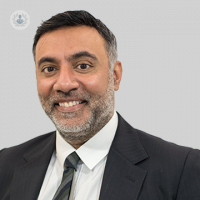Am I suitable for lens replacement surgery?
Written by:Every year, millions of lens replacement surgeries are carried out for people with poor vision. Thanks to the latest technology, this type of surgery is now available to people who may have been rejected in the past. Mr Vik Sharma, an expert lens surgeon, explains who is now suitable for this procedure and what you should look for when choosing a surgeon.

At what age can I have lens replacement surgery?
Lens replacement surgery is suitable for all ages but is much more beneficial to people above the age of 45. It is around this age when people start becoming presbyopic and require reading spectacles.
There aren’t any age limits on lens replacement surgery, as every case is different and the severity of conditions vary from person to person. It’s up to you and your surgeon to decide on the best option.
Do I need to be affected by a serious condition, such as cataracts or glaucoma to benefit from lens replacement?
No, anyone who wants to dramatically reduce their dependence on spectacles is suitable.
Usually, lens replacement surgery is carried out on people with presbyopia or extreme short or farsightedness for whom laser eye surgery is not an option. Also, lens surgery allows better, more stable results than any Lasik procedure.
If you have cataracts then the procedure will remove the cloudy lens and replace it with a new, clear artificial lens to give you sharper and clearer vision.
There are two different types of artificial lenses to choose from:
- Monofocal – these improve your distance sight, however, after surgery, you will still need to wear glasses to see objects clearly up-close.
- Multifocal – (including trifocal and EDOF lenses) these improve your distance, middle and near vision.
What pre-existing health conditions make someone unsuitable for lens replacement?
If you have another eye condition, such as macular degeneration, you may not benefit from a lens replacement procedure. Certain lenses are only suitable for certain conditions and this can be fully discussed during the consultation.
As a general rule, if you notice your vision is better with spectacles or contacts then you can achieve the same improvement with lens replacement.
If I’m not suitable for lens replacement, what would my next option be?
If you’re younger than 45 years of age, implantable contact lens (ICL) surgery may be a better option for you, as it doesn’t involve removing your natural lens.
ICL surgery involves a quick insertion of a contact lens into your eye to correct your prescription. This procedure is ideal as it is maintenance-free and gives excellent vision for distance.
What should I look for when choosing a specialist to perform my lens replacement surgery?
You should look for an experienced surgeon who holds a consultant position dealing with complex hospital cases, has all the resources needed (equipment and clinic) and is independent, so you have the freedom to choose the best lens for yourself. Unfortunately, some large private companies restrict the choice you have.
You also want to be able to access your surgeon at all times - not someone you only see at the time of the surgery! And of course, you should feel confident with your surgeon, be able to talk to him or her and be assured that all your needs are fully met.
If you believe you are suitable for lens replacement surgery, visit Mr Vik Sharma’s profile and book a consultation with him to talk about your options.


